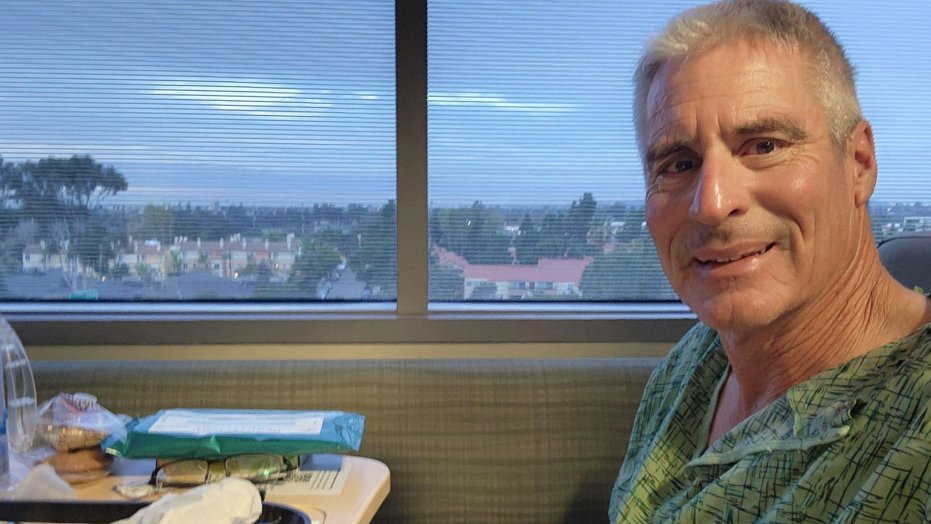
Relief for chronic sinusitis
An ENT doctor answers questions about common treatments for chronic sinusitis.
It was beautiful day for a bike ride. And as an avid cyclist for most of his 57 years, Chris Adams took any opportunity to get on his bike and go for a ride, averaging about 4,000 miles per year.
On January 8, while traveling about 20 mph in the bike lane, his front tire hit a crack in the road. Chris flew off his bike, sending him chest-first into the guard rail and landing him on the pavement. Fortunately, another cyclist saw the accident and called 911, while a passing driver blocked the road with his car to protect him until the ambulance arrived.
Chris was fully conscious and in a lot of pain. In a state of shock, he didn’t realize how severe his injuries were. He called his wife and told her that he was being taken to the Sharp Memorial Hospital Emergency Room.
Serious injuries increase risk for further complications
Once Chris arrived in the emergency room, he remembers a team of doctors and nurses surrounding him, making assessments. He was told that he had 12 fractured ribs and a collapsed lung. After several hours in the trauma unit, Chris was stabilized and transferred to 4 West, a trauma and neurosurgical progressive care unit.
“Chris’s injuries were still very severe and put him at high risk for respiratory failure and other complications,” says Calvin Clark, MSN, ACNP-BC, a trauma nurse practitioner at Sharp Memorial. “Over the course of the first two days, Chris needed to have a chest tube inserted. Fortunately, he was in remarkable physical shape before the accident and had an amazing attitude. He was extremely compliant with his medical therapies, which helped him dodge those complications.”
However, because Chris was so healthy and active, Clark notes he was very anxious to return to his previous level of function. He reports Chris required additional daily counseling to remember to keep his world small, focus on recovery, and manage expectations for the speed of his recovery.
“Because of his physical strength and stamina, Chris was challenged to manage his expectations for recovery and stick to the medical treatment plan,” says Clark. “He had to be reminded to slow down and celebrate the tiny victories, rather than focusing on his temporary inability to go out and ride his bike for dozens of miles at a time.”
Within a few days, Clark says Chris was fully onboard. He understood exactly what he needed to do to get better.
On the long road to recovery
Chris was in the hospital for over a week, healing and building up his strength so he could go home. He spent many days walking around the unit with a nursing assistant or physical therapist, determined to regain his health so he could get back to living his life. For someone who was constantly on the go, it was a frustratingly slow process.

Chris enjoying the view as he recovers at Sharp Memorial Hospital
However, Chris says that from the time he entered the hospital until the time he left, the “amazing” Sharp Memorial staff played a key role in his recovery. They were caring and patient, he says, answering his many questions about when he could get back on a bike again and keeping his spirits up.
“You have to realize that it’s going to take time to heal,” says Chris. “As frustrating as it may be, the staff are there to help you.”
According to Clark, recovery requires a delicate balance of hydration, nutrition, adequate rest, mild to moderate level of physical activity, stress management and a positive attitude. Patients in recovery from severe, potentially life-altering traumatic injuries require assistance and therapy from nurses, respiratory therapists, physical therapists, occupational therapists, spiritual care providers, nutritionists, pharmacists, case managers, social workers and doctors.
What’s more, when patients return home, assistance has to come from friends, family members, outpatient services, pastors or members of church groups. Fortunately, Chris has friends and family who continue to support his recovery.
Ready to get back in the saddle
Chris was discharged from the hospital on Jan. 15. Although he still has months of physical therapy in front of him, he is already looking forward to his next bike trip.
“I may have to start out on a stationary bike at first,” Chris says. “But I can’t wait to get back on a real bike soon.”
Clark has no doubt Chris will be hitting the road once again. “I am confident that he will make a full recovery and be back doing what he loves in no time,” he says. “He is an amazing person — an inspiration — and I feel fortunate to have played a tiny role in his recovery.”
Learn more about the quality of care at Sharp; get the latest health and wellness news, trends and patient stories from Sharp Health News; and subscribe to our weekly newsletter by clicking the "Sign up" link below.

The Sharp Health News Team are content authors who write and produce stories about Sharp HealthCare and its hospitals, clinics, medical groups and health plan.

Calvin Clark, MSN, ACNP-BC, is a trauma nurse practitioner at Sharp Memorial Hospital.
Our weekly email brings you the latest health tips, recipes and stories.